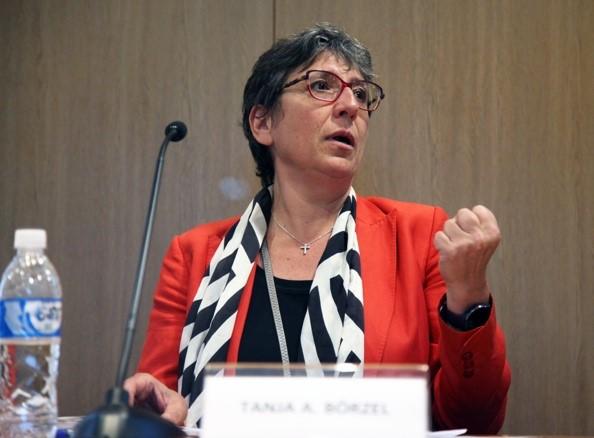Renewal Proposal | SCRIPTS Sets Course for its Second Act: An interview with Tanja Börzel
Tanja Börzel speaks during SCRIPTS' Latin America Conference in São Paulo, Brazil
Image Credit: Vinicius Dotti | Fundação Fernando Henrique Cardoso
SCRIPTS has just submitted its renewal proposal for the next phase of the German Research Foundation's (in German, DFG – Deutsche Forschungsgemeinschaft) Excellence Strategy, marking an exciting milestone for the entire SCRIPTS community. We had the opportunity to sit down with our speaker, Tanja A. Börzel, to discuss the future of the Cluster. In this interview, Tanja shares her groundbreaking and inspiring thoughts on SCRIPTS' future direction, including new research priorities and reflections on the goals already achieved.
News from Sep 26, 2024
SCRIPTS has just submitted the proposal for the next phase of the Excellence Strategy, which will start in 2026. What are the Cluster's goals for the upcoming phase?
Tanja Börzel: In the first funding period, SCRIPTS analysed the nature of current contestations of the liberal script around the world and identified their major causes. Contestations have not only increased globally, they have also deepened. We argue that polarisation and radicalisation are largely produced by the liberal script itself. In the next funding period, we will focus on the consequences of the deepening of contestations for the liberal script. Do we see a rewriting, or is the liberal script resisting change, which might eventually lead to its replacement by a non- or illiberal alternative? There seems to be variation in the liberal script’s capacity to respond to deep contestations. We want to find out why some varieties are more resilient than others.
Can you expand on the concept of democratic resilience that is being introduced in this proposal? How will this concept be operationalised in the activities of the Cluster?
Tanja Börzel: Democratic resilience relates to the capacity of democracies to adapt to the challenges of illiberalism. Contestations of core liberal values, such as independent courts, free media, autonomous civil society, or the protection of minorities, do not necessarily result in democratic regression. It depends on how actors respond to them. Politics and society can ignore or defy the contestations and the grievances mobilised by illiberal contestants. Or, they can engage and address them, resulting in a progressive rescripting. We want to identify scope conditions that make some varieties of the liberal script more resilient than others. To what extent, for instance, are militant democracies (Germany) better able to cope with authoritarian populism and religious fundamentalism than tolerant democracies (US)?
In this current funding period, the Cluster carried out numerous projects and partnerships through the Knowledge Exchange Lab – for example, the Humboldt Forum exhibition and the partnership with the German Federal Foreign Office – to translate research results into insights for the general public and stakeholders. How does the Cluster plan to approach knowledge exchange in the upcoming phase?
Tanja Börzel: In the second funding period, we will continue our successful partnership with the German Foreign Office and extend it to other government institutions, not only at the national but also the EU level. Berlin is, after all, the capital of the largest EU member state. SCRIPTS will also intensify its knowledge transfer and exchange activities with the Berlin Abgeordnetenhaus and the German Bundestag. Finally, we want to build new partnerships with civil society organisations and cultural actors to explore ways of strengthening democratic resilience.
Developing and conducting state-of-the-art research is one of the objectives of the Excellence Strategy. This inevitably means attracting top researchers in their fields and supporting the career development of both early-career and senior researchers. How does the Cluster intend to carry out this objective?
Tanja Börzel: SCRIPTS is based on excellence through diversity, both of people and perspectives. This entails doing research with, rather than merely on, other regions of the world. Our international partner network is a core pillar of our internationalisation strategy. It also helps us to recruit PhD and postdoctoral researchers from disadvantaged regions and communities. A striking example is Sphoorti, a PhD student from Jawaharlal Nehru University in New Delhi, who just concluded our Academic Accelerator Fellowship, a programme aimed at first-generation academics. Not only did the fellowship have a significant impact on the development of her research, she also contributed immensely to the SCRIPTS community with her expertise and personal experience.
Talking about the past phase, which will be coming to an end next year, what would you say were the highlights of the Cluster’s activities and achievements?
Tanja Börzel: In the past five years, the Cluster has accomplished a lot. We have grown into a community that shows a remarkable level of diversity, both in people and perspectives. This is why we have been able to produce an impressive amount of research outputs, ranging from more than one thousand articles and books, almost 50 Working Papers, nearly 100 blog posts, think pieces, and arguments, and four public lecture series. Personally, I am particularly impressed by the placement of our early-career researchers, many of whom have taken up positions with leading universities all over the world and have landed great jobs outside academia. Cases in point are the stories of our alumni, Alexander Sorg, who will start a postdoctoral position at Harvard this autumn, and Lukas Antoine, who secured a position as a data analyst at the Stifterverband für die Deutsche Wissenschaft immediately after concluding his PhD at SCRIPTS.

